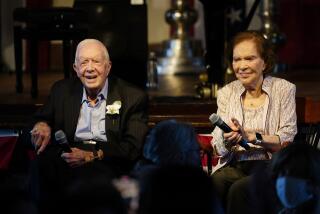10% of Medicare Hospitalizations Found Unnecessary
- Share via
WASHINGTON — More than 800,000 Medicare hospital patients--about 10% of those admitted in a year--do not belong in hospitals because such care was “not medically justified,” the inspector general of the Health and Human Services Department said Wednesday.
Although the admitting physicians said they believed the patients should have been hospitalized, panels of doctors who studied a sample of Medicare case records said that 10% of those patients did not need the type of acute care offered by hospitals, said Richard P. Kusserow, the inspector general.
The study did provide some encouraging news, however, determining that 0.8% of patients were prematurely discharged, a figure far lower than the estimates offered by many critics who say that patients are being sent home “quicker and sicker.”
The Medicare system pays hospitals a fixed amount for each patient, a fee determined by 468 diagnostic classifications. Because of the limited fee schedule, hospitals have a strong financial incentive to get the patient out of bed and home as soon as possible.
Praises Discharge Process
However, Kusserow told reporters in releasing the results of the study, “the evidence does not justify the argument that ‘quicker and sicker’ discharge is a major problem. Hospitals have been putting a lot of attention in the discharge planning process.”
Hospitals and the review organizations that study their operations now should shift their focus to the issues of incorrect admissions and the quality of treatment during a hospital stay, Kusserow said.
“The No. 1 concern now is what happens when mom gets in the hospital. What concerns me greatly are inappropriate treatment plans,” he said.
Admissions errors are more likely to take place in small hospitals and in rural areas, according to preliminary results of the study. Kusserow said that details of the research will be available later on the types of cases and diagnoses most commonly involved in the incorrect admissions. More information on the cost of treating these cases also will be available, he said.
Study Findings Disputed
The medical community disputed Kusserow’s estimate of incorrect admissions.
“Hindsight is always perfect,” said Dr. James S. Todd, senior deputy executive vice president of the American Medical Assn. “Suppose a physician goes to the emergency room in the middle of the night to see a 75-year-old man having chest pains. It could be a heart attack, a gallbladder attack or gas,” Todd said.
“The physician will always make the decision in favor of the patient,” Todd said. “I would rather admit him and find out the next day it was gas than send him home where he could die of a heart attack.”
The HHS report is “Monday morning quarterbacking of a physician’s decision,” said Jack Owen, executive vice president of the American Hospital Assn. “Medicine is an art, not a science. The biggest complaint we get from the public is that more people want to be admitted. They say: ‘You’re taking care of me on an outpatient basis when you should admit me.’ ”
The HHS study said the Medicare payment system may encourage hospitals to try to increase profits by classifying patients in more costly payment categories. This difference in classification totaled $308 million, an amount equal to 1.3% of the $27 billion paid by Medicare to hospitals in the 1985 fiscal year, the study estimated.
Kusserow said it is not clear whether the classification differences were related to economic considerations.
Principal Diagnosis
But Owen said, for example, that if a patient enters a hospital suffering from diabetes, a stroke and a broken hip, the hospital must decide which ailment will be the principal diagnosis for the Medicare payment system. In addition, he said, the error rate in such classifications has been improving steadily since the payment system was begun in 1983.
Although he called for improvement in handling admissions and treatment, Kusserow said the quality of hospital care has been upgraded under the current payment system. Before 1983, hospitals were reimbursed for the full cost of the bills they submitted to the federal government.
Kusserow said the change to fixed-fee payments has imposed discipline. Now, he said, “you have an incentive for hospitals to know what is going on with their staff physicians.”
More to Read
Sign up for Essential California
The most important California stories and recommendations in your inbox every morning.
You may occasionally receive promotional content from the Los Angeles Times.












